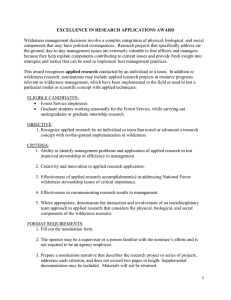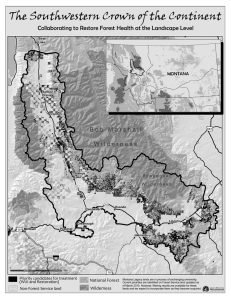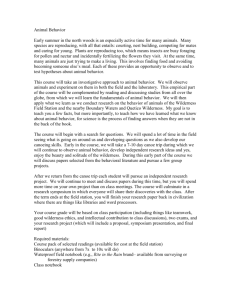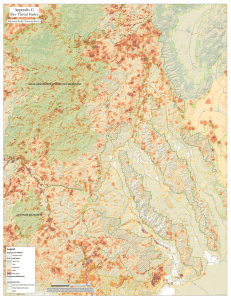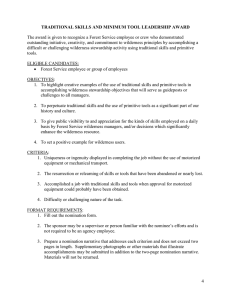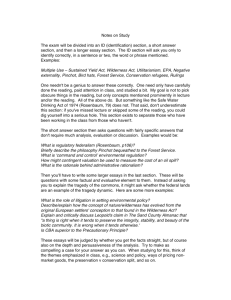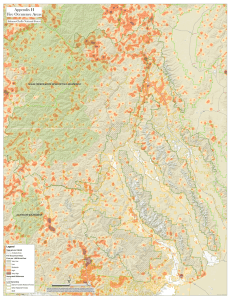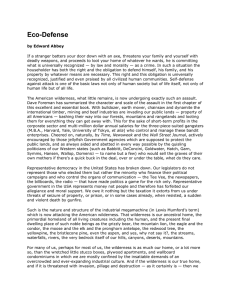SCIENCE and RESEARCH
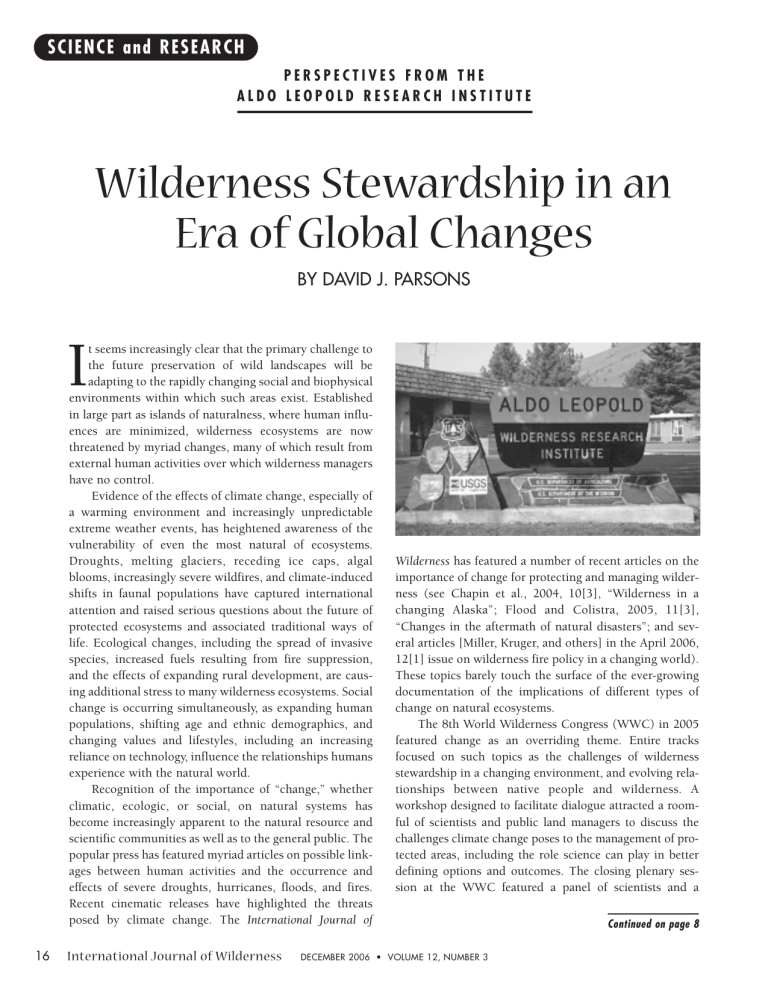
SCIENCE and RESEARCH
P E R S P E C T I V E S F R O M T H E
A L D O L E O P O L D R E S E A R C H I N S T I T U T E
Wilderness Stewardship in an
Era of Global Changes
BY DAVID J. PARSONS
I t seems increasingly clear that the primary challenge to the future preservation of wild landscapes will be adapting to the rapidly changing social and biophysical environments within which such areas exist. Established in large part as islands of naturalness, where human influences are minimized, wilderness ecosystems are now threatened by myriad changes, many of which result from external human activities over which wilderness managers have no control.
Evidence of the effects of climate change, especially of a warming environment and increasingly unpredictable extreme weather events, has heightened awareness of the vulnerability of even the most natural of ecosystems.
Droughts, melting glaciers, receding ice caps, algal blooms, increasingly severe wildfires, and climate-induced shifts in faunal populations have captured international attention and raised serious questions about the future of protected ecosystems and associated traditional ways of life. Ecological changes, including the spread of invasive species, increased fuels resulting from fire suppression, and the effects of expanding rural development, are causing additional stress to many wilderness ecosystems. Social change is occurring simultaneously, as expanding human populations, shifting age and ethnic demographics, and changing values and lifestyles, including an increasing reliance on technology, influence the relationships humans experience with the natural world.
Recognition of the importance of “change,” whether climatic, ecologic, or social, on natural systems has become increasingly apparent to the natural resource and scientific communities as well as to the general public. The popular press has featured myriad articles on possible linkages between human activities and the occurrence and effects of severe droughts, hurricanes, floods, and fires.
Recent cinematic releases have highlighted the threats posed by climate change. The International Journal of
Wilderness has featured a number of recent articles on the importance of change for protecting and managing wilderness (see Chapin et al., 2004, 10[3], “Wilderness in a changing Alaska”; Flood and Colistra, 2005, 11[3],
“Changes in the aftermath of natural disasters”; and several articles [Miller, Kruger, and others] in the April 2006,
12[1] issue on wilderness fire policy in a changing world).
These topics barely touch the surface of the ever-growing documentation of the implications of different types of change on natural ecosystems.
The 8th World Wilderness Congress (WWC) in 2005 featured change as an overriding theme. Entire tracks focused on such topics as the challenges of wilderness stewardship in a changing environment, and evolving relationships between native people and wilderness. A workshop designed to facilitate dialogue attracted a roomful of scientists and public land managers to discuss the challenges climate change poses to the management of protected areas, including the role science can play in better defining options and outcomes. The closing plenary session at the WWC featured a panel of scientists and a
Continued on page 8
16
International Journal of Wilderness
DECEMBER 2006 • VOLUME 12, NUMBER 3
Csikszentmihalyi, Mihaly. 1997. Finding Flow:
The Psychology of Engagement with
Everyday Life . New York: Harper Collins.
Emmons, Robert. 1999. The Psychology of
Ultimate Concerns: Motivation and
Spirituality in Personality . New York: The
Guilford Press.
Piedmont, Ralph L. 2001. Spiritual transcendence and the scientific study of spirituality. Journal of Rehabilitation 67:
4–14.
Foster Riley, Marilyn, and John C. Hendee.
2001. Wilderness vision quest clients, motivations, and reported benefits from an urban based program, 1988–1997.
In Wilderness and Humanity: The Global
Issue, Proceedings from the 6th World
Wilderness Congress, Bangalore, India , ed. Vance G. Martin and M. A. Partha
Sarathy (267–74). Golden, CO: Fulcrum
Publishing.
Kaplan, Steven, and Janet F. Talbot. 1987.
Psychological benefits of a wilderness experience. In Behavior and the Natural
Environment , ed. I. Altman and F. F.
Wohlwill. New York: Plenum.
Greenway, Robert. 1995. The wilderness effect and ecopsychology, In .
Ecopsychology , ed. T. Roszak, M. E.
Goes, and A. D. Kanner (p. 128). San
Francisco: Sierra Club Books.
McDonald, Barbara et al. 1989. The spirit in the wilderness: The use and opportunity of wilderness experience for spiritual growth. In Wilderness Benchmark 1988:
Proceedings of the National Wilderness
Colloquium , held in Tampa, Florida,
January 13–14, 1988 (pp. 193–207).
Asheville, NC: U.S. Southeast Forest
Experiment Station.
Csikszentmihalyi, Mihaly. 1990. Flow: The
Psychology of Optimal Experience . New
York: Harper & Row.
Csikszentmihalyi, Mihaly. 1991. Leisure and self-actualization. In Benefits of Leisure , ed. B. L. Driver, P. J. Brown, and G. L.
Peterson (91–97). State College, PA:
Venture Publishing.
Hammitt, William. 1994. The psychological functions of wilderness solitude. In
International Wilderness Allocation,
Management, and Research , ed. John C.
Hendee and Vance G. Martin (277–33).
Ft. Collins, CO: International Wilderness
Leadership (WILD) Foundation.
Hollenhorst, Steve, Ernest Frank III, and Alan
Watson. 1994. The capacity to be alone:
Wilderness solitude and growth of the self. In International Wilderness Allocation,
Management, and Research , ed. John C.
Hendee and Vance G. Martin (pp.
234–39). Ft. Collins, CO: International
Wilderness Leadership (WILD) Foundation.
Murie, Olaus J. 1973. Journeys to the Far
North . Palo Alto, CA: The Wilderness
Society and the American West Publ.
Newberg, Andrew, and Eugene D’Aquili.
2001. Why God Won’t Go Away: Brain
Science and the Biology of Belief . New
York: Ballantine Books.
ROGER KAYE is a wilderness specialist and airplane pilot with the U.S. Fish and
Wildlife Service on the Arctic National
Wildlife Refuge and an affiliate professor of
Northern Studies at the University of
Alaska. He can be contacted by email at roger_kaye@fws.gov.
From WILDERNESS STEWARDSHIP on page 16 popular author addressing the theme of Managing Wilderness in a Time of
Global Change. Other conferences, including the Natural Areas Conference in September 2006 (Managing
Natural Areas in the Face of Global
Climate Change) and the April 2007
George Wright Society Conference
(Rethinking Protected Areas in a
Changing World, www.georgewright.
org/2007.html), also feature change as their primary theme.
the future of wilderness. As a result, at least three of the Institute’s future focus areas for research include change as a significant driver. These include understanding changing relationships between humans and wilderness, stewardship of fire under changing climatic and social conditions, and global change effects on fauna (see leopold.wilderness.net).
Although wilderness ecosystems have long been recognized as
Only recently have we come to realize the magnitude of the impact of human-induced changes on wilderness ecosystems and values.
During the 2005 program review of the Aldo Leopold Wilderness
Institute, much was heard about the need to better understand the potential implications of changing climatic, ecologic, and social conditions for dynamic entities that are continually changing, the scale of such change has generally been considered to be within the range of historic variability, and as such, part of the wilderness attributes that are to be protected.
Only recently have we come to realize the magnitude of the impact of human-induced changes on wilderness ecosystems and values. The idea of wilderness as a pristine landscape that can, by simply leaving it alone, be preserved in perpetuity, is no longer compatible with the realities of today’s world. It is apparent that the greatest challenge to ensuring the future sustainability of wilderness will be our ability to understand, mitigate, and adapt to the multiple facets of the changing world we live in.
Meeting this challenge will require unprecedented proactive collaboration and cooperation between scientists, managers, politicians, and the general public.
DAVID J. PARSONS is director of the Aldo
Leopold Wilderness Research Institute,
USDA Forest Service, Rocky Mountain
Research Station, Missoula, MT, USA; email: djparsons@fs.fed.us.
8
International Journal of Wilderness
DECEMBER 2006 • VOLUME 12, NUMBER 3
